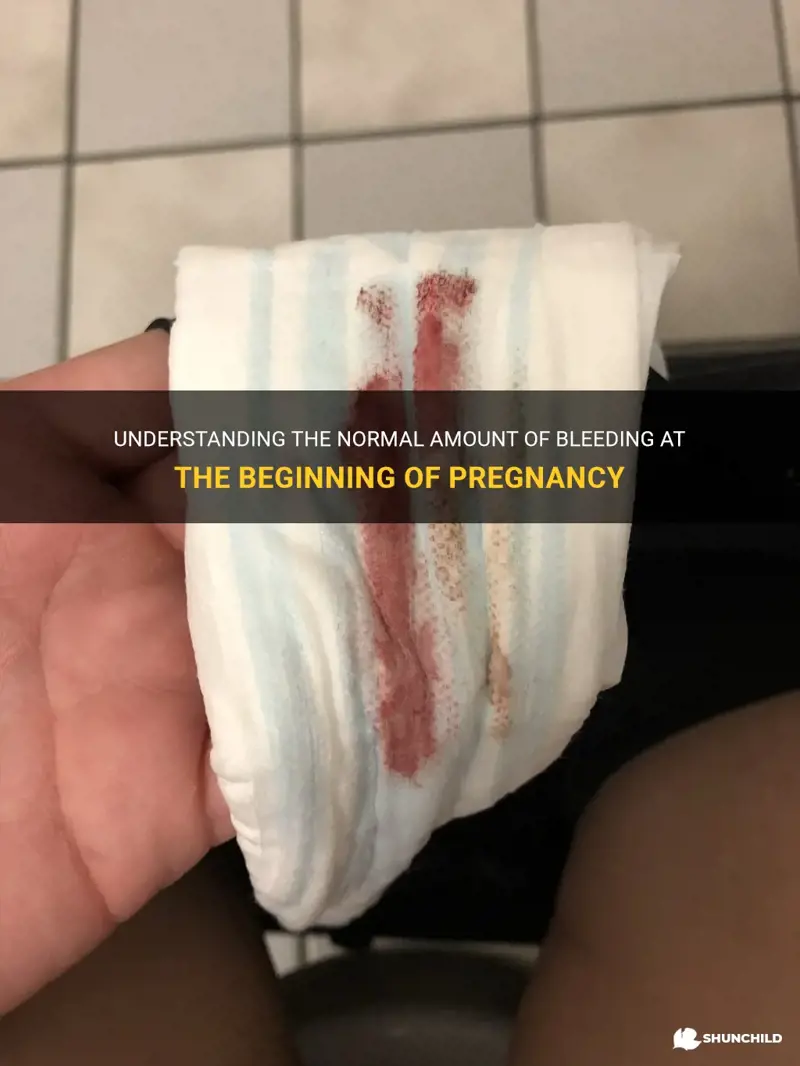
Pregnancy, a miraculous journey filled with excitement and anticipation, occasionally comes with its own set of concerns. For expectant mothers, one of the most common worries is the occurrence of bleeding during the early stages. While it is natural to be alarmed, it is important to understand that some bleeding can be completely normal and harmless. In this article, we will delve into the reasons behind this phenomenon, shed light on when bleeding could indicate a problem, and provide reassurance to all those mothers-to-be who may have experienced this alarming but often benign occurrence.
| Characteristics | Values |
|---|---|
| Color of bleeding | Light pink/brown |
| Amount of bleeding | Light to moderate |
| Duration of bleeding | Few hours to few days |
| Presence of clots | None to small |
| Pain or cramping | Mild to none |
| Other symptoms | None |
| Pattern of bleeding | Spotting or intermittent |
| Timing of bleeding | Usually within first trimester |
| Medical attention required | Not usually, but consult doctor |
What You'll Learn
- What are the common causes of bleeding at the beginning of pregnancy?
- How much bleeding is considered normal during the early stages of pregnancy?
- Are there any additional symptoms that may accompany normal bleeding in early pregnancy?
- When should I be concerned about the amount of bleeding during early pregnancy?
- What steps should I take if I experience heavy bleeding during the initial stages of pregnancy?

What are the common causes of bleeding at the beginning of pregnancy?
Bleeding at the beginning of pregnancy is a common concern for many women. It can be a stressful and worrisome experience, especially for those who are trying to conceive or have experienced previous pregnancy complications. In this article, we will explore the common causes of bleeding at the beginning of pregnancy and provide valuable information to put your mind at ease.
Before we delve into the causes, it's important to understand that not all bleeding during pregnancy is a cause for concern. In fact, many women experience light spotting or bleeding in early pregnancy, and it often resolves on its own without any intervention. However, it is always important to consult with your healthcare provider if you experience bleeding or any concerning symptoms.
One common cause of bleeding in early pregnancy is implantation bleeding. This occurs when the fertilized egg attaches itself to the wall of the uterus. Implantation bleeding is typically light and may appear as pink or brown spotting. It usually occurs around the time of your expected period and resolves within a day or two.
Another common cause of bleeding is cervical changes. During pregnancy, the cervix undergoes several changes to prepare for childbirth. Increased blood flow to the cervix can cause it to become more sensitive, leading to light bleeding or spotting. This type of bleeding is usually harmless and may occur after sexual intercourse or a pelvic examination.
In some cases, bleeding in early pregnancy may be a sign of a threatened miscarriage. This occurs when there is a slight separation of the placenta from the uterine wall. Symptoms of a threatened miscarriage include bleeding, abdominal cramps, and back pain. It is important to seek medical attention if you experience these symptoms, as your healthcare provider will be able to monitor your condition and provide any necessary interventions.
Ectopic pregnancy is another potential cause of bleeding in early pregnancy. This occurs when a fertilized egg implants outside of the uterus, typically in the fallopian tubes. In addition to bleeding, women with an ectopic pregnancy may experience abdominal pain, dizziness, and shoulder pain. Ectopic pregnancies can be life-threatening and require immediate medical attention.
Less common causes of bleeding in early pregnancy include molar pregnancies and cervical polyps. Molar pregnancies occur when abnormal tissue grows in the uterus instead of a normal fetus. This can lead to heavy bleeding and may require medical intervention. Cervical polyps are benign growths on the cervix that can cause bleeding, especially during pregnancy. While they are usually harmless, your healthcare provider may decide to remove them if they are causing significant bleeding or discomfort.
In conclusion, bleeding in early pregnancy can be caused by a variety of factors. While many cases of bleeding are harmless and resolve on their own, it is important to consult with your healthcare provider if you experience bleeding or any concerning symptoms. They will be able to evaluate your individual circumstances and provide appropriate guidance and care. Remember, every pregnancy is unique, and understanding the common causes of bleeding can help alleviate anxiety and provide reassurance during this exciting time.
Gagging During Pregnancy: Understanding the Causes and How to Cope
You may want to see also

How much bleeding is considered normal during the early stages of pregnancy?
Bleeding during the early stages of pregnancy can be a cause of concern for many women. It's important to understand what is considered normal and when medical attention is necessary.
In general, a small amount of spotting or light bleeding can be normal during the early stages of pregnancy. This is called implantation bleeding and occurs when the fertilized egg attaches itself to the lining of the uterus. Implantation bleeding usually occurs around 10 to 14 days after conception and is typically lighter in flow and color compared to a regular menstrual period.
If you experience light spotting or bleeding that lasts for a day or two and doesn't require the use of a pad or tampon, it is likely not a cause for concern. However, it is always recommended to consult with your healthcare provider to rule out any underlying conditions or complications.
On the other hand, heavy bleeding, bright red blood, or passing of clots during early pregnancy may indicate a more serious issue and requires immediate medical attention. These symptoms could be signs of a miscarriage, ectopic pregnancy, or other pregnancy complications. It's important to contact your healthcare provider immediately if you experience any of these symptoms.
If you are unsure about the amount of bleeding you are experiencing, try keeping track of the number of pads or tampons you use in a day. If you require more than one pad or tampon within an hour or are passing large clots, it is considered heavy bleeding and should be evaluated by a healthcare professional.
In addition to the amount of bleeding, pay attention to other symptoms you may be experiencing. Severe abdominal pain, dizziness, lightheadedness, or shoulder pain could indicate a more serious condition and require urgent medical attention.
It's worth noting that not all women experience bleeding during early pregnancy, and the presence or absence of bleeding does not necessarily indicate the viability of the pregnancy. Many women go on to have healthy pregnancies despite experiencing some bleeding in the early stages.
If you are experiencing bleeding during early pregnancy, it's essential to communicate with your healthcare provider. They will be able to provide you with personalized guidance and evaluate your specific situation. It's always better to be safe than sorry when it comes to the health of you and your baby.
In conclusion, a small amount of spotting or light bleeding can be considered normal during the early stages of pregnancy. However, heavy bleeding, bright red blood, passing of clots, or any other concerning symptoms should be addressed by a healthcare provider immediately. It's important to remember that every pregnancy is unique, and what may be normal for one woman may not be for another. Trust your instincts and reach out to your healthcare provider for guidance and reassurance.
Understanding Cramps in Pregnancy on the Last Day of Your Period: Is it Normal?
You may want to see also

Are there any additional symptoms that may accompany normal bleeding in early pregnancy?
Experiencing bleeding during early pregnancy can be a cause for concern. However, it is important to note that not all bleeding indicates a problem. In fact, about 20-30% of pregnant women experience some form of bleeding during the first trimester, and many of these pregnancies go on to have successful outcomes.
When it comes to normal bleeding in early pregnancy, it is usually lighter in flow and duration compared to a regular menstrual period. It may appear pink or brown in color and is often referred to as "spotting". However, there are some additional symptoms that may accompany normal bleeding, which can help differentiate it from abnormal bleeding.
One common symptom that may accompany normal bleeding in early pregnancy is mild cramping. This is often described as similar to period cramps and is usually not severe. The cramping is caused by the uterus expanding and preparing for the growing fetus.
Another symptom that may occur alongside normal bleeding is mild backache. This can be attributed to the gradual changes in the body, such as hormonal shifts and the stretching of ligaments to accommodate the pregnancy.
Additionally, some women may experience breast tenderness or changes in their breasts during early pregnancy. This can include increased sensitivity, swelling, or darkening of the nipples. These changes are due to the hormonal fluctuations that occur during pregnancy and are considered normal.
It is worth noting that every woman's experience of pregnancy is unique, and not all women will experience these additional symptoms. Some women may only experience bleeding without any accompanying symptoms, and that can still be within the realm of normal.
However, it is important to be aware of the signs that may indicate a problem. If the bleeding is heavy, bright red, or accompanied by severe pain, it may be a sign of a miscarriage or ectopic pregnancy. Other concerning symptoms include dizziness, fainting, or passing clots. If any of these symptoms occur, it is crucial to seek medical attention immediately.
In conclusion, while bleeding during early pregnancy can be alarming, it is not always a cause for concern. Normal bleeding during early pregnancy is usually lighter and shorter than a regular period and may be accompanied by mild cramping, backache, or breast changes. However, if the bleeding is heavy, bright red, or accompanied by severe pain, it is important to seek medical attention as it may indicate a problem. It is always better to be safe and consult with a healthcare provider to ensure the well-being of both the mother and the baby.
The Negative Consequences of Teenage Pregnancy: A Closer Look
You may want to see also

When should I be concerned about the amount of bleeding during early pregnancy?
Bleeding during early pregnancy can be a cause for concern for many women. While some spotting and light bleeding can be normal, it is important to be aware of when to be concerned about the amount of bleeding. Here are some factors to consider:
- Amount of blood: Light spotting or bleeding that requires only a panty liner is usually not a cause for concern. However, if you are soaking through a pad or tampon within an hour, it is important to seek medical attention as this could be a sign of a more serious issue.
- Color of blood: In early pregnancy, the blood is often light pink or brown in color. This is typically old blood and can be a normal part of the implantation process. However, bright red blood or blood with clots could indicate a miscarriage or ectopic pregnancy, and medical attention should be sought immediately.
- Cramping and pain: Mild cramping can be common in early pregnancy as the uterus begins to stretch and expand. However, if you are experiencing severe pain or cramping along with heavy bleeding, it could be a sign of a miscarriage or ectopic pregnancy and should be evaluated by a healthcare professional.
- Duration of bleeding: Light spotting that lasts for a day or two is usually not a cause for concern. However, if the bleeding becomes heavier or continues for several days, it is important to seek medical attention.
- Other symptoms: Pay attention to any other symptoms you may be experiencing. If you are feeling lightheaded, dizzy, or have a fever along with heavy bleeding, it could indicate a more serious issue and should be evaluated by a healthcare professional.
It is always better to err on the side of caution when it comes to bleeding during early pregnancy. If you are at all concerned about the amount of bleeding, it is important to reach out to your healthcare provider. They can evaluate your symptoms, perform any necessary tests, and provide guidance and support. Remember, every pregnancy is different, and it is always better to seek medical advice rather than trying to self-diagnose.
Understanding the Factors that Determine the Quality of Sperm for Successful Pregnancy
You may want to see also

What steps should I take if I experience heavy bleeding during the initial stages of pregnancy?
Heavy bleeding during the initial stages of pregnancy can be a cause for concern and may indicate a miscarriage or other complications. It is important to take prompt action and follow certain steps to ensure your health and safety. Here are the steps you should take if you experience heavy bleeding during the early stages of pregnancy:
- Stay Calm: While it is natural to feel worried and anxious, try to stay calm and collected. Stress and anxiety can have negative effects on your body and may exacerbate the situation.
- Contact Your Healthcare Provider: Reach out to your healthcare provider immediately to inform them about the heavy bleeding you are experiencing. They will be able to guide you on the next steps to take based on your individual circumstances.
- Describe the Situation: Provide your healthcare provider with detailed information about the bleeding. How heavy is the bleeding? Are you experiencing any pain, cramping, or discomfort? Is there any tissue or clots in the blood? These details will help your healthcare provider assess the situation more accurately.
- Follow Their Guidance: Your healthcare provider may ask you to come in for an examination or provide further instructions based on your symptoms. It is crucial to follow their guidance and advice. They may recommend bed rest, avoiding sexual intercourse, or other precautions to help prevent further complications.
- Monitor the Bleeding: Keep track of the amount and pattern of bleeding. Note the color, consistency, and any changes over time. This information will be useful for your healthcare provider in evaluating your situation.
- Take Care of Yourself: Follow good self-care practices to ensure your overall well-being. Get plenty of rest, eat nutritious meals, stay hydrated, and avoid strenuous activities. It is important to prioritize your physical and mental health during this time.
- Seek Emotional Support: Experiencing heavy bleeding during pregnancy can be emotionally challenging. Reach out to your partner, family, or close friends for support. You may also consider joining a support group or seeking professional counseling to help cope with the emotional impact of the situation.
- Prepare for Possible Outcomes: Unfortunately, heavy bleeding during early pregnancy can sometimes result in a miscarriage. While this is a difficult possibility to consider, it is important to be prepared both emotionally and practically. Educate yourself about miscarriage, including its signs and symptoms, and discuss your options with your healthcare provider.
It is important to note that heavy bleeding during early pregnancy does not always indicate a miscarriage. It can also be caused by other factors such as implantation bleeding, hormonal changes, or infections. However, it is crucial to seek medical attention to ensure your safety and the well-being of your pregnancy.
Remember, every pregnancy is unique, and the steps you need to take may vary. Your healthcare provider is the best person to guide you through this challenging time, so do not hesitate to reach out to them for advice and support.
Understanding Progesterone Testing in Normal Pregnancy: What You Need to Know
You may want to see also
Frequently asked questions
It is normal to experience some light spotting or bleeding during the first trimester of pregnancy. This is known as implantation bleeding and occurs when the fertilized egg attaches itself to the uterine lining. Implantation bleeding is usually light and short in duration, and may be accompanied by mild cramping.
Implantation bleeding typically lasts for one to two days, although some women may experience it for a shorter or longer duration. The bleeding is usually light and may appear as pink or brown spotting. If the bleeding becomes heavy or is accompanied by severe pain, it is important to contact your healthcare provider.
Although spotting or light bleeding can be a normal occurrence in early pregnancy, it can also be a sign of a miscarriage. It is important to monitor the amount and type of bleeding, as well as any accompanying symptoms such as cramping or abdominal pain. If you are experiencing heavy bleeding, severe pain, or passing tissue, it is crucial to seek medical attention immediately.
If you have any concerns about bleeding during early pregnancy, it is recommended to consult with your healthcare provider. They will be able to assess your individual situation and provide guidance based on your symptoms and medical history. It is especially important to seek immediate medical attention if the bleeding is heavy, accompanied by severe pain, or if you have any other concerning symptoms.







